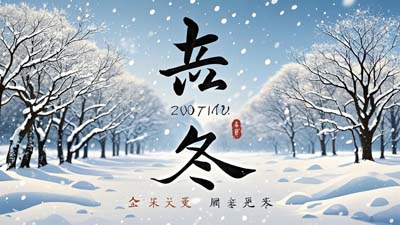Nov.7, 2008, is the day of “Lì dōng(立冬)”, it is the Beginning of Winter in China! Li Dong is the 19th solar term, besides Li Dong, there are 24 Solar Terms.

The 24 solar terms is a gross name of the system that comprises of 12 major solar terms and 12 minor solar terms interlaced with each other. Starting from “vernal equinox”, the 12 major solar terms are “vernal equinox”, “corn rain”, “corn forms”, “summer solstice”, “great heat”, “end of heat”, “autumnal equinox”, “frost”, “light snow”, “winter solstice”, “severe cold” and “spring showers”.

Each major solar term falls on one of the 12 lunar months designated by the 12 earthly branches.
The minor solar term after “vernal equinox” is “bright and clear”, and then in turn “summer commences”, “corn on ear”, “moderate heat”, “autumn commences”, “white dew”, “cold dew”, “winter commences”, “heavy snow”, “moderate cold”, “spring commences” and “insects waken”.
Following is the Chinese name of 24 Solar Terms
立春 (Lì chūn) the Beginning of Spring (1st solar term) Feb.3,4, or 5
雨水 ( Yǔ shuǐ) Rain Water (2nd solar term) Feb.18,19 or 20
惊蛰(Jīng zhé) the Waking of Insects (3rd solar term) Mar.5,6, or 7
春分 (Chūn fēn) the Spring Equinox (4th solar term) Mar.20,21 or 22
清明 ( Qīng míng) Pure Brightness (5th solar term) Apr.4,5 or 6
谷雨 (Gǔ yǔ) Grain Rain (6th solar term) Apr.19,20 or 21
立夏 (Lì xià) the Beginning of Summer (7th solar term) May 5,6 or 7
小满 (Xiǎo mǎn) Lesser Fullness of Grain (8th solar term) May 20,21 or 22
芒种 (Máng zhǒng) Grain in Beard (9th solar term) Jun.5,6 or 7
夏至 (Xià zhì) the Summer Solstice (10th solar term) Jun.21 or 22
小暑 (Xiǎo shǔ) Lesser Heat (11th solar term) Jul.6,7 or 8
大暑 (Dà shǔ) Greater Heat (12th solar term) Jul.22,23 or 24
立秋 (Lì qiū) the Beginning of Autumn (13th solar term) Aug.7,8 or 9
处暑 (Chù shǔ) the End of Heat (14th solar term) Aug.22,23 or 24
白露 (Bái lù ) White Dew (15th solar term) Sep.7,8 or 9
秋分 (Qiū fēn) the Autumn Equinox (16th solar term) Sep.22,23 or 24
寒露 (Hán lù) Cold Dew (17th solar term) Oct.8 or 9
霜降 (Shuāng jiàng) Frost’s Descent (18th solar term) Oct.23 or 24
立冬 (Lì dōng) the Beginning of Winter (19th solar term) Nov.7 or 8
小雪 (Xiǎo xuě) Lesser Snow (20th solar term) Nov.22 or 23
大雪 (Dà xuě) Greater Snow (21th solar term) Dec.6,7 or 8
冬至 (Dōng zhì) the Winter Solstice (22th solar term) Dec.21,22 or 23
小寒 (Xiǎo hán) Lesser Cold (23th solar term) Jan.5,6 or 7
大寒 (Dà hán) Greater Cold (24th solar term) Jan.20 or 2
And there is a song for remembering the 24 Solar Terms:
Chūn yǔ jīnɡ chūn qīnɡ ɡǔ tiān ,xià mǎn mánɡ xià shǔ xiānɡ lián。
春 雨 惊 春 清 谷 天, 夏 满 芒 夏 暑 相 连。
Qiū chù lù qiū hán shuānɡ jiànɡ ,dōnɡ xuě xuě dōnɡ xiǎo dà hán。
秋 处 露 秋 寒 霜 降, 冬 雪 雪 冬 小 大 寒。
Chinese Culture
HSK Test
General Chinese (Beginner Level)
General Chinese (Intermediate Level)



